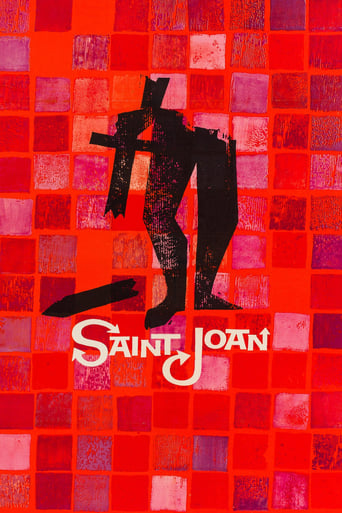


Otto Preminger's notorious version of GB Shaw's SAINT JOAN was pummeled by critics on its first release due in large part to the director's controversial casting of novice Jean Seberg in the title role. While it's clear that Seberg did not possess the chops to pull of a role as complex and challenging as Joan of Arc, it's also evident, by her performance, that she's not wholly terrible either. She's not what is chiefly wrong with this film, a condensed version of the Shaw play (the screenplay is by Graham Greene). Preminger, who reportedly held the piece in the highest regard since his youth, was perhaps too close to it to put together a fully satisfying movie. His directing style, which by 1957 included many sweeping camera shots and few cuts, was not what a play this intimate needed. Although the sets by Ray Simm (built at Pinewood Studios in England) are pitch perfect, the film has a very chilly feel to it. Preminger's bigger casting blunder was to surround Seberg with the likes of John Gielgud, Anton Walbrook & Richard Todd, acting giants who soundly dwarf her. Worst of all is Richard Widmark as the sniveling Dauphin. Meant to be a child like innocent, Widmark plays his role as a feral court jester. Still, there's a number of pluses: Georges Périnal's stunning B&W photography, a rousing score by Mischa Spoliansky and many familiar faces in the (mostly) British supporting cast: Felix Aylmer, Finlay Currie, Harry Andrews and David Oxley as the bitchy "Bluebeard."
... View MoreThis movie is a should-be classic. It's not perfect, certainly. The pacing, while perfect for the stage, is in movie form slow as a tortoise with arthritic knees. Jean Seberg is misdirected to be too sweet and too gentle. She fully shows enough acting talent, skill, and craft to convincingly play the clever, passionate, and confident Joan, but, unfortunately, the director missed the point of the character. George Bernard Shaw is my favorite playwright. In no other play has his dialog been more sharp, nor the lines more musical. However, processing this film requires that you look at it as a lawyer. This movie is a case, and the viewer is the judge. That is how this picture is to be enjoyed. 7/10.
... View MoreThis is an under-rated version of the story of the farm girl who fought the British and helped kick them out of France. Seberg is nowhere near as bad in this movie as reputation would suggest (and looks great with a way cool cropped hair-do), and there are good performances from Geilgud, Richard Widmark, and Richard Todd. It does have to be said, though, that this is not a movie for action-lovers - the centrepiece of Joan leading the troops in the liberation of Orleans, for example, is replaced by a fade-to-black! The movie is also quite stagey and it is stylistically easy to think it was made at least ten years earlier than it's 1957 release date. The movie makes a nice change if you are fed up with the Ingrid Bergman version, though.
... View MoreHaving seen the Peter O'Toole version recently, I was ready to be awed by the smart writing in this version. Little time is spent on the fighting, which I prefer. Instead, we are shown all the many motives underlying both the French and English (who held Normandy) politicos and priests who put her to death. Even the worst hypocrite of them all, the archbishop, leaves us with the thought that "Of course, she was innocent. The innocent have always had to suffer for the ambitions of the mighty. She had no idea what she was saying, no idea of the implications of blasphemy or going against the church. Unschooled, she had no idea of what the church's stand on such matters even was."Preminger was true to the myths surrounding her death, and I appreciated the preview on the tape that showed the flames reaching up and burning her. Why? They used gas jets in the movie, and 2 of them were stopped up. Suddenly, the air pressure blew out the stoppage and the flames leaped up right on her. Thankfully for her, they didn't have to repeat the shot as it was SO realistic: she WAS being burned!! Pretty traumatic introduction for an Iowa girl to her new career of acting.John Gielgud performed outstandingly. He is the English politico who is orchestrating the show. He also makes the point that once you condemn someone to death, you don't want to be around to watch them die. You might shrink from your 'duty' the next time...not that such delicacies bother the soul of our would-be president. We Christians, even the most anti-Semitic have no problem with falling back on the Old Testament when it comes to capital punishment, even though it was overridden by Jesus' words. Bring on public executions like this little girl's. Smelling burnt flesh might bring us respectable folks to our souls' senses.The only little 'pick' I have about this film is that we are not shown why the priest who has been so adamantly urging her burning becomes so suddenly so contrite, even to the point of madness. There should have been more expansion of his character, more dialogue--as the sudden 'coming to his senses' doesn't make sense.And, whether Graham Greene does this deliberately or not, St. Joan is such a self-assured little upstart, you almost but not quite, are glad she meets her come-uppance. And, when she turned down life in prison, for some reason I thought of Anne Sexton, the poet who accused Sylvia Plath of 'stealing her death' when she committed suicide ...knowing such an action guarantees immortality. You gotta wonder!!If ever there was a good example of obsessive thought and logic-tight compartments, this is one. St. Joan should have turned Buddhist and quieted the 'voices in her mind'.
... View More